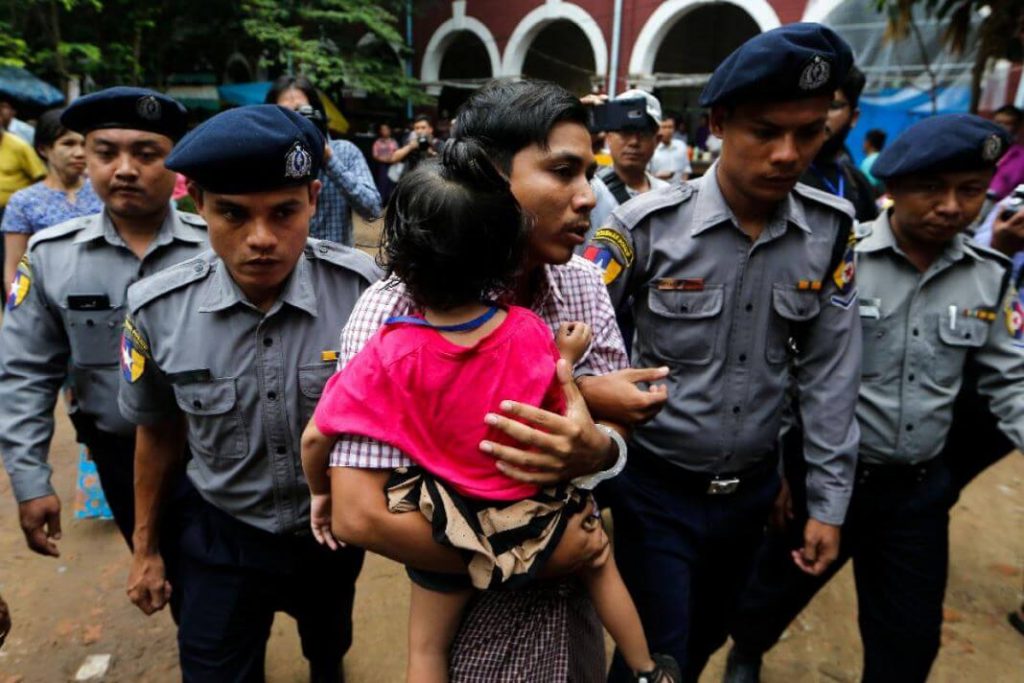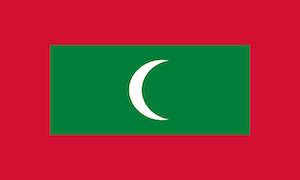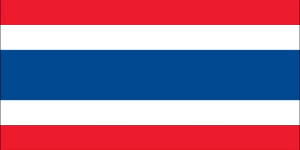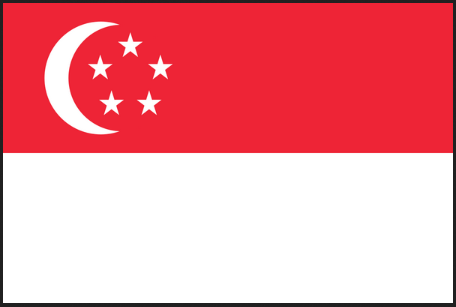June 22, 2018

Reuters journalist Kyaw Soe Oo and his daughter are escorted by police during a court hearing in Yangon, Myanmar on June 18th. Reuters, Ann Wang.

Sam Rainsy, former president of the now-dissolved opposition party CNRP, has been summoned by a court for allegedly violating the country’s le?se majeste? law, which prohibits insulting the royal family. Sam Rainsy had posted on his Facebook that a letter recently published by the king endorsing the elections was either fabricated or written under duress: he is now the fourth person to be facing charges for violating the le?se majeste? law. The third arrest was made over the weekend when a citizen wrote an article making death threats. The court order directs the opposition member, who is living in self-exile to avoid ten other possibly politically motivated court cases, to appear “in a timely manner” before the court. Rainsy dismissed the summons in another Facebook post, reiterating his belief that the letter “has no legal value” and that “[the] present king is being held hostage by Hun Sen, who is forcing him to support an autocratic and traitorous regime.”

Murders across Mexico this week continued the streak of killings that have been ongoing since May, which was the deadliest recorded month in Mexico’s history since 1998. Two mayoral candidates, Omar Gomez Lucatero (an independent from the state of Michoacan) and Fernando Angeles Juarez (a candidate of the leftist Democratic Revolution Party) were killed on Thursday, joining the ranks of 16 other candidates who have been murdered while campaigning for the July 1st election and 113 candidates murdered since September 2017.
The past week has been as difficult for Mexican protesters and activists as it has for politicians. On Wednesday, a truck plowed into a crowd of protesting teachers at Mexico’s southern border, killing at least seven. Three gay rights activists Ruben Estrada, Carlos Uriel Lopez, and Roberto Berga were also found dead on Wednesday after being shot and left on the side of a highway. Authorities suspect their deaths may be linked to extortion, but little information is available thus far.
In other news, harsh Mexican immigration policies barring South American immigrants from entering Mexico’s Southern border are expected to change following July’s election, according to foreign policy analysts. The immigration stances of Mexico’s forthcoming administration will also have a direct impact on the migrant policies of the United States (which has long worked with Mexico to limit migration from Central America), especially given international uproar over the US’ child-separation policies over the past several weeks.

Negotiations in Nicaragua have come to a halt between the government and an alliance of opposition groups, despite mediation efforts by the Catholic Church. There is, however, consensus on both sides to invite international rights organizations to investigate the violence over the last two months, which lead to over 180 deaths. International groups have officially received approval to travel to Nicaragua for investigations.
April 19 Movement resistance fighters lost control of the city of Masaya to government-backed paramilitary forces and police this week when government forces breached the city to retrieve a police commander who was being held hostage. The violent conflict has left at least 3 dead and 30 injured. However, a Vatican ambassador and other Catholic mediaries were successful in persuading police to a cease-fire in the city.
Hate crimes, extortion, kidnappings and other crimes continue throughout the region while the government maintains that protesters are terrorists. Anyone who has participated in a protest is subject to imprisonment.

The unjust detention of two Reuters reporters Kyaw Soe Oo and Wa Lone is in its sixth month. Last week, key police witness Major Tin Win Maung did not show up at court. This week, the same officer has been accused of being unreliable after it was discovered that he had violated police regulations. Tin Win Maung copied the statements made by other witnesses because “he wanted to know more about the case.” This is against regulations because a police officer acting as a witness could align his testimony with other witnesses if given access to their statements.
The press freedom case is important because it is part and parcel with Myanmar’s discursive persecution of the Rohingya people through censorship of media. In fact, Myanmar’s Ministry of Information stated that using the term “Rohingya” is “strictly prohibited.” They threatened both Radio Free Asia and the BBC by stating they would not be allowed to air their content on state channels. Regardless, both RFA and the BBC have refused the censorship and quit their partnership with state-run MRTV channel. They will make their content available in Myanmar via shortwave radio, social media and websites.
Myanmar’s government and local media address the Rohingya people as “Bengalis,” which is consistent with their continued efforts to deny the Rohingya people citizenship despite their generational legacies in Myanmar. Aung San Suu Kyi, formerly regarded as a champion of human rights and democracy and de facto leader of the country, has joined the rest of Myanmar’s government in suppressing speech. In 2016, she stated that the words “Rohingya” and “Bengali” are “emotive” terms that should not be used. On Thursday, a statement was posted on Aung San Suu Kyi’s Facebook page that condemned “hate narratives” for driving Myanmar communities further apart. This alarming statement comes after Myanmar’s continued denial to call the atrocities committed against the Rohingya acts of ethnic cleansing. The convergence of media censorship and the outrageous violence against the Rohingya people comes to show that this process of ethnic cleansing is intimately intertwined with a genocide of history and name.
Currently, there are more than 700,000 Rohingya refugees in Bangladesh, almost all of whom have settled in Bangladesh’s Cox’s Bazar district which is extremely vulnerable to monsoons, flooding, and landslides. The monsoons have already destroyed more than 3,000 shelters, resulting in deaths and displacement. The conditions of the refugee camps are especially destructive for Rohingya women and girls. They face discrimination and stigma and are denied mobility and access to education. In the face of these difficulties, Rohingya women and aid workers are working to create women-only healthcare and counseling centers, as well as communities for Rohingya women.
Global tensions with North Korea continue to ease after the US-North Korea Summit last week. Japan has stopped simulating North Korean missile attack protocols and evacuations in local schools. China will allow North Korean airline Air Koryo to fly between Pyongyang and Xi’an starting in July, soon to be one of five Chinese cities with direct flights to North Korea’s capital. Similarly, Kim Jong Un visited China this week for the third time since March, speaking with president Xi Jinping who has publicly promised to uphold and support North Korea’s denuclearization. However, skeptics suspect that Kim’s increasingly positive relationship with China will be leveraged against the United States, especially given the recently escalated trade war between the US and China. This certainly casts some doubt on the long-term viability of positive US-North Korea relations. South Korea’s foreign minister also announced that sanctions against North Korea would remain until “complete denuclearization has been achieved.”
A demonstration of over 22,000 women took place in Seoul last weekend — marking the largest women’s march in the country’s history. The women were protesting against the growing use of spy cams across the country–secret cameras installed in public places such as bathrooms and changing rooms whose footage is recorded and distributed without individual consent. The presence of such cameras has become so prevalent that women frequently wear masks when using public restrooms or showers in order to hide their identity in case they are being filmed. This is the second major demonstration on the issue, following one in late May which included nearly 12,000 protestors; both marches were organized by Women March for Justice.

After a great deal of criticism from Democrats, activists, and even his family, President Trump signed an executive order which would disallow the separation of families of illegal immigrants entering the United States. Though he maintained that strict border regulations will persist, he caved to enormous political pressure with this policy. By signing the order, Trump and his allies have abandoned the position that they held for weeks: that Democrats were to blame for the inhumane separation of immigrants and the administration had its hands tied on this issue. Additionally, Trump’s order might conflict with the 1997 Federal Court decision, which “strictly limits the ability to keep children in detention centers.”Correspondingly, the House of Representatives has rejected a hardline immigration bill. Furthermore, because the executive order lessened pressures on the legislature, the House has delayed a vote on a legislative compromise. Activists in Portland, Oregon have vowed to shut down their local Immigration and Customs Enforcement (ICE) offices and end Trump’s zero-tolerance approach towards immigration. The group has called itself #OccupyICEPDX and this movement has spread to other cities with protestors setting up camp outside ICE offices in New York and Los Angeles.
The administration’s threat to impose an additional $200 billion tariff on Chinese imports if China retaliates against current US tariffs has sent shock-waves through stock markets across the world. The looming trade war has negatively affected the Shanghai composite and European stock markets and the Dow is predicted to have a loss as well. Trump’s tariffs are devised to hamper China’s program to promote high-tech industries and the 2025 “Made in China Program. However, the administration underestimates the loss by U.S firms that outsource production to China and China’s ability to easily substitute its trade partners.
Keeping up with their promises from the Sentosa Summit, the Pentagon has “suspended all planning” for joint military exercises with South Korea scheduled for August. A major challenge for General Mattis, the Secretary of Defense, is to channel Trump’s broad intentions to limit “war games” into specific military guidance.
The United States withdrew from the United Nations Human Rights Council (UNHRC) citing discriminatory treatment of Israel. Along with Iran, Eritrea and North Korea, the United States is one of the few countries in the World to voluntarily refuse UNHRC membership. Considering that the United Nations human rights architecture was primarily built by the United States, it remains to be seen what impact the withdrawal will have on the conception and condemnation of human rights abuses.

As the July 30th elections approach, the international community continues to pressure the government, which took power in a coup in November, into holding free and fair elections without reverting to the coercion and violence of past elections. The international community has also questioned the role of military officials in the current government and the government’s commitment to democracy. Additionally, UN observers have criticized difficulties with the electoral commission and its delayed release of the voter rolls to opposition parties. Despite these complications, the elections have fostered optimism for the future of the country as a record-breaking 23 candidates have been declared for the presidency and violence has been at an all-time low.

Three opposition lawmakers, Imthiyaz Fahmy, Mohamed Ameeth, and Faisal Naseem, are now allowed to travel after a three-month travel ban. The lawmakers were barred from leaving the country after urging the public to join nationwide demonstrations in March. This prevented Mohamed Ameeth from attending his grandfather’s funeral and Faisal Naseem from accompanying his son who received urgent medical treatment abroad.

After ruthlessly taking back Damascus and Homs from rebel troops, President Assad has focused his offensives in southwest Syria with the help of Russian and Iranian forces. Attacks have escalated and have endangered and displaced countless civilians. However, Assad’s military operations are complicated by the regional interests of Israel, Jordan, and the United States. Heather Nauert, a spokesperson for the US State Department, claimed that Assad’s military and militia units “have violated the southwest de-escalation zone and initiated airstrikes, artillery, and rocket attacks.” She followed with a warning that the Russian and Syrian governments will face “serious repercussions.”
Meanwhile, in Northern Syria, Kurdish forces are being pushed into negotiating with the Syrian government due to concerning signals from Russia, Turkey, and the United States. Both Russia and the United States appear to be allying with Turkey against the Kurdish people. Russia approved Turkey’s Operation Olive Branch against the YPG (Kurdish People’s Protection Units) in Afrin. Despite the YPG’s instrumental role in helping fight the Islamic State, the United States and Turkey are co-planning a future for the city of Manbij that does not include a place for the Kurds. Therefore, the fight for Kurdish autonomy is shifting towards negotiating with Assad.
The meeting between Russia, Turkey, and Iran led by UN Syria envoy Staffan de Mistura took place on Tuesday. However, the meeting failed to produce definitive conclusions or make much progress on drafting a new Syrian constitution. For example, who will be included in the constitutional committee is still in question. There also continue to be concerns as to whether the new constitution will effectively curb the powers of the government.
UN investigations in Eastern Ghouta have revealed a slew of war crimes committed by Assad’s regime. A leaked draft of the UN report details the use of bombardments, mass starvation, and chemical weapons against civilians, which violates the 2013 international treaty that bans chemical weapons in Syria. It also includes videos and testimonies of a deadly assault on April 7th of this year that killed 49 people, 11 of whom were children.

Diosdado Cabello was appointed as head of the Constituent Assembly, taking over for Delcy Rodriguez after Maduro chose her as his vice president. The controversial and all-powerful legislative body will now be headed by a man under sanctions by the United States for alleged drug trafficking, embezzlement, and money laundering.
17 people died this week when a tear gas canister went off after a brief brawl inside a nightclub, triggering a stampede as people fled the building. At least 11 died of asphyxiation. It is unclear how a civilian acquired the canister, as only police and armed forces are intended to have them, and in fact, have used them against protesters in the past. Officials are conducting an investigation and have detained seven suspects based on eyewitness accounts, as well as the club owner for his failure to implement measures to block weapons from entering the space.
The country can breathe a sigh of relief after final test results confirmed for the World Health Organization that polio has not, in fact, returned to Venezuela.
Maduro announced he is raising the minimum wage for the fourth time this year, although the wage will still be below 2.00 USD a month by the black market exchange rate.
As inflation rises and Venezuelans go hungry, soldiers were deployed to Venezuelan food markets to check prices price-controlled items as a countermeasure in the “economic war” that Maduro says the international community is waging on his country through sanctions. The minister for industry and production, Tarek El Aissami, said they had found “fraudulent price manipulation” at the markets. Maduro claimed that the soldiers arrested “Mafiosi, wholesalers, thieves, and capitalists.”
Eight people were convicted of participating in a 2015 coup attempt this Wednesday. Three were civilians, five were members of the armed forces, and each was issued a sentence of between 3 and 6 years in prison by a military court according to the group Foro Penal. At the time of the coup, Maduro claimed the opposition was backed by the United States government, in keeping with the rhetoric he has used throughout his rule. Another rights organization has said that around a total of 150 members of the armed forces are in prison for “political reasons.”
Venezuela’s prosecutor-general, Tarek William Saab, ordered the arrests of 16 farmers who failed to meet their contractual obligations to deliver 38% of their harvest to DelAgro, a state-owned enterprise which had invested almost 1.4 million USD in the producers. Separately, Saab announced that 309 bank accounts were blocked for receiving illegal remittances from relatives abroad Mexico, Colombia, Brazil, Honduras, and Uruguay. Saab insists that the only legal channels for remittances are through Western Union and MoneyGram.

The worst road accident of the year in Bolivia occurred in southern Potosi late Friday, killing 17 people and leaving over 30 injured. The driver was killed as the bus collided with a boulder at a very high speed. Investigations are being held to determine whether there was a possible mechanical error, or if the crash was simply the result of reckless driving.
On Tuesday, Bolivian President Evo Morales stopped in China to continue his international tour to gain more investments for his country. During his visit, Morales met with Chinese General Secretary Xi Jinping to sign an agreement to help foster and shape their international relationship. As a result of the signed agreement, Bolivia will be integrated into the New Silk Road initiative. Morales also met with Chinese Premier Li Keqiang to discuss Bolivian exports and make an agreement on Chinese investment in Bolivia’s infrastructure.
An armed assault on a Bolivian military base led to the arrest of three members of the Brazilian mafia. Two soldiers were wounded and many weapons were stolen during the assault, along with 1,200 rounds of ammunition. Bolivia’s Minister of Government Carlos Romero is concerned that the remaining Brazilian and Bolivian gang members who fled the scene are conspiring to commit violent action. Romero stated that “within the space of a few days they have attacked twice, so it seems like they are preparing something big.”
The tensions regarding the Silala dispute between Chile and Bolivia continue to fester as the case develops in the International Court of Justice (ICJ). President Morales decided not to present a countersuit against Chile this week, but will instead submit a counter-memorial to the ICJ before September of this year.

On Sunday, Democratic Center candidate Iván Duque won the presidential run-off election with 54% of the vote, making him the second youngest president in the country’s history at age 41. In his victory speech to the nation, Duque emphasized that his party “does not want to tear the agreement to shreds” but rather “make it clear that a Colombia at peace is a Colombia where peace meets justice”.
According to the Attorney General, six legislative candidates are under investigation for vote buying in the March legislative elections, including elected senators Margarita Restrepo, Fabian Castillo, Lilbeth Llinas, Julian Besoya, and Maria Fernanda Cabal.
On Thursday, the three bodies of missing Ecuadorian press workers were found. The workers had disappeared in March while investigating an uptick in drug-related violence along the Colombia-Ecuador border and were believed to be kidnapped after gruesome photos of them surfaced in April, though the authenticity of the photos could not be proved.

During last week’s protests in Ho Chi Minh City, an American citizen named Will Nguyen was arrested for disturbing the peace. This week, a confession video of Nguyen was released where he stated “I understand that my acts violated the law. I regret that I caused trouble for people heading to the airport.” Speculations of forced confession circulate due to Vietnam’s history of suppressing free speech as a part of their communist regime. Nguyen still has not yet been released. His older sister Victoria Nguyen and classmate Mary Alice Daniel are both fighting for his liberation with United States congress.

Thailand has resumed its use of the death penalty after a nine year moratorium. The shift in policy has drawn concerns from human rights groups as hundreds of people remain on death row; the end of the moratorium comes as authorities continue to reform the criminal justice system in the country leading to concerns about fair sentencing and human rights.
Peace talks in the southern province of Pattani have been delayed by a transition in the Malaysian government. Thai authorities emphasized their commitment to the talks to end the insurgency with the ethnic-Malay group, MARA Patini.
A recent statement by Prime Minister Chan-o-cha announced that the government will not hold elections until after the coronation of King Vajiralongkorn, who assumed the throne in 2016. The announcement has cast doubts on whether the government will uphold the promise of elections by February since no date for the coronation has been set.

Three high-profile Polish judges have complained of a “state-led campaign of intimidation and harassment.” Polish judges are increasingly reluctant to handle political cases and are under insurmountable pressure to align with the policies and attitudes of the Duda Government. The Warsaw-based Helsinki Foundation of Human Rights has noted that even state prosecutors who have expressed concerns about political interference have had disciplinary proceedings initiated against them.
The Law and Justice Party’s (PiS) disputed law, which will force 40% of the current Polish judiciary to retire, is set to motion on the third of July. Since the executive holds more sway in the appointment of judges, a massive exodus of judges at this point would make for a more politicized judiciary.
Law and Justice Party leader Jaros?aw Kaczy?ski, who had not made a public appearance since April, returned to work this week. Though he does not hold any public office, he is the founder of the PiS and exercises control over “handpicking ministers and strategic decisions about the economy.” Concerns over his health were paramount as many Polish scholars feel that his departure could result in a substantive realignment in Polish right-wing politics.

A video from 2014 resurfaced this week in social media circles showing a Singaporean man yelling at a Mandarin-speaking worker to “go back to your country.” This video has reignited a conversation in both China and Singapore about treatment of ethnic Chinese in Singapore.
Five South Korean protestors were arrested outside the St. Regis Hotel in Singapore, where North Korean leader Kim Jong Un stayed during his summit meeting with US President Donald Trump. The five women were told to cease all protesting activities and were arrested upon their refusal.
Laos – Locals and officials gathered in Vientiane on Saturday to raise awareness of the high rate of dengue fever present in the country. Separately, a proposed hydropower dam is under review to investigate its environmental impact. – Vientiane Times | Khmer Times
Malaysia –This week Malaysia announces Nor Shamsiah Mohd Yunus as Central Bank official two weeks after Muhammad Ibrahim resigned. – Bloomberg
Togo – Togolese activists, despite continued threats of arrest and hate crimes, are protesting against Faure Gnassingbe’s existing government and are using social media to facilitate this change. – Economist
Cuba – President Miguel Diaz-Canel’s new government policies have relaxed some rules on state-run media. Media outlets may now report on some news before official statements by the Communist Party. However, state and independent outlets still face strong restrictions on how they can reporting the government’s activity, and these reforms remain far from the norm for freedom of the press. – Washington Post
CANVAS News
Hypocritical (Non-)Commitment to Human Rights Plagues White House
Jun 20, 2018
Avi Selk, Washington Post The United States withdrew from the United Nations Human Rights Council (UNHCR) on Tuesday amidst growing criticisms against Trump’s zero-tolerance immigration policies.
Increasing Hate Crimes against Journalists threaten Indian Democracy
Jun 18, 2018
A rising tide of intolerance threatens journalists in India. Since Prime Minister Narendra Modi took office in 2014, journalists have been facing greater threats from an increasingly polarized environment in India.